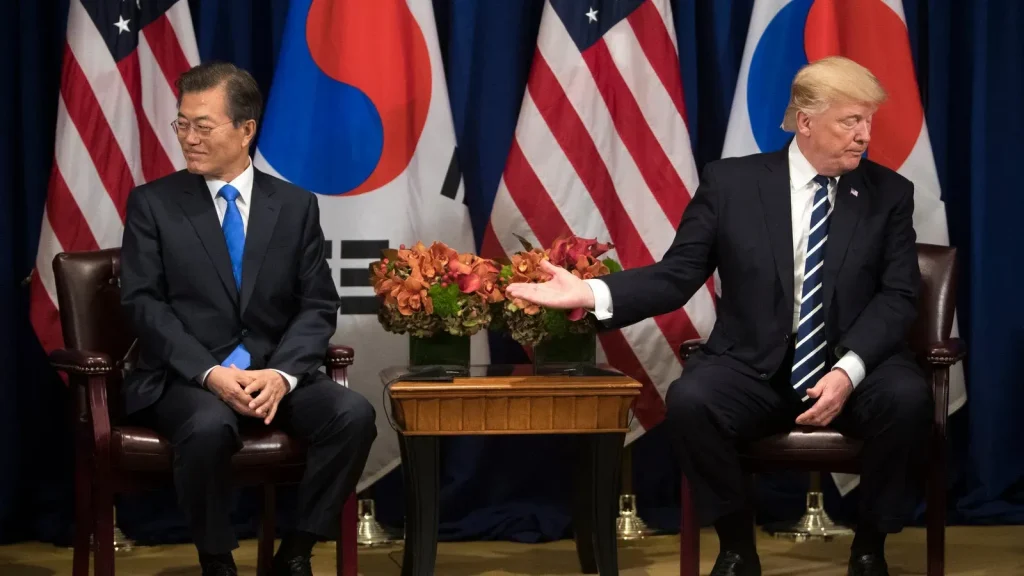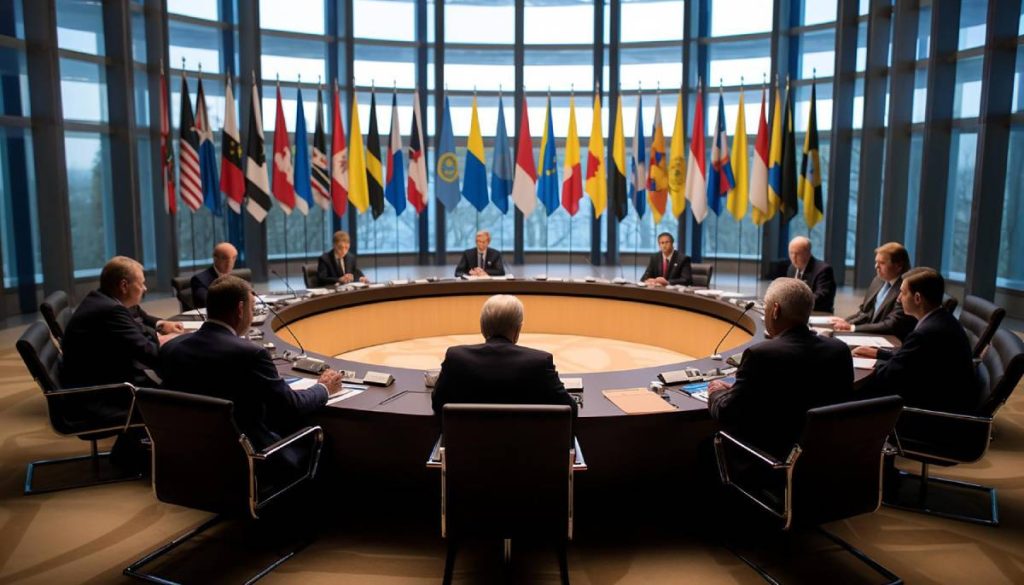The recent US South Korea trade talks have sparked significant interest as both nations work to eliminate new tariffs impacting their economic relationship. During a productive meeting in Washington, U.S. Treasury Secretary Scott Bessent highlighted the potential for swift progress, indicating that discussions on technical terms will resume shortly. The U.S. and South Korea are keen to address critical issues such as tariff elimination and trade imbalances, with South Korea specifically seeking exemptions from various tariffs imposed by the U.S. These trade negotiations are crucial not only for the South Korean economy but also for fostering a collaborative atmosphere in sectors like shipbuilding and energy. As both countries prepare for upcoming meetings, officials are optimistic about finalizing a comprehensive package by mid-July, which could significantly reshape the current trade landscape.
In a bid to fortify economic ties, the recent discussions between the United States and South Korea mark a pivotal moment in international trade negotiations. This initiative aims to navigate the complexities of reciprocal tariffs and foster growth opportunities in key industries. The ongoing talks seek to alleviate the burden on sectors such as automobiles, which have been adversely affected by existing tariffs. As both nations strategize on substantial measures like investment cooperation and currency policy, the focus remains on creating a balanced framework that benefits both economies. With South Korean officials also eager to explore collaborations in energy and shipbuilding, these negotiations could redefine their economic partnership.
Overview of US-South Korea Trade Talks
The recent trade negotiations between the United States and South Korea marked a significant step forward for both economies. With a focus on eliminating U.S. tariffs that have posed challenges to the South Korean economy, the discussions are crucial for maintaining a robust trade relationship. U.S. Treasury Secretary Scott Bessent and South Korean officials, led by Finance Minister Choi Sang-mok, have emphasized the potential for rapid progress in these discussions. This indication of a broad agreement on future negotiations highlights the commitment both nations have to resolving pending trade issues.
In the first round of trade talks held in Washington, Korean delegates expressed optimism as discussions centered on critical sectors, including automobile production and energy collaborations. The acknowledgment of tariff elimination as a goal is vital for South Korea, which currently faces high reciprocal tariffs imposed by the U.S. The negotiations are expected to cover not only tariffs but also non-tariff measures and investment cooperation, thereby addressing various aspects of trade that affect both countries. This comprehensive approach indicates a strategic alignment as both nations strive for economic stability and growth.
Impact of US Tariffs on South Korea
The imposition of tariffs by the United States has had a notable impact on the South Korean economy, particularly in sectors like automobiles and steel. South Korean manufacturers are grappling with a 25% tariff on goods exported to the U.S., which threatens their competitive positioning in one of their largest markets. As trade negotiations continue, the elimination or reduction of these tariffs is a primary agenda item for South Korean officials, aiming to restore market equilibrium and retain jobs within the domestic automotive sector that are at risk due to these trade barriers.
Trade negotiations with the U.S. present South Korea with a critical opportunity to re-evaluate its trade policies and strengthen its economic framework. The proposed collaboration in various sectors, as discussed in recent talks, could enhance the South Korean economy’s resilience to external shocks. Furthermore, addressing the trade imbalance through these discussions may open avenues for increased exports while alleviating pressure from U.S. tariffs. With economic security on the line, South Korea’s ability to navigate these negotiations will be pivotal for its future economic health.
Key Areas in US-South Korea Trade Negotiations
The ongoing trade talks between the U.S. and South Korea are set to focus on four critical areas: tariffs and non-tariff measures, economic security, investment cooperation, and currency policy. By having structured discussions around these topics, both parties hope to reach a comprehensive understanding that addresses mutual concerns. The emphasis on tariffs and non-tariff measures is particularly important for South Korea, as they seek exemptions from existing restrictions that hinder exports, thereby enhancing bilateral trade.
Economic security and investment cooperation are pivotal areas that could lead to mutual benefits for both nations. South Korea’s focus on energy projects, such as those involving liquefied natural gas (LNG), signifies a broader interest in ensuring energy security while exploring investment opportunities with U.S. companies. Additionally, establishing a stable currency policy will bolster financial relations, which is essential given the dynamic global market environment. The success of these discussions is contingent upon both parties committing to open dialogue and finding common ground.
Future Steps in US-South Korea Trade Discussions
Following the initial round of trade talks, future steps involve detailed technical discussions set to begin shortly. U.S. Treasury Secretary Scott Bessent indicated that the conversations will progress quickly, with a ‘July package’ as a key milestone for both sides. Achieving tangible outcomes by July 8 is crucial, as this timeline aligns with the lifting of reciprocal tariffs. The outcome of these discussions will likely set the tone for subsequent negotiations, influencing not only the immediate economic landscape but also shaping long-term trade relations.
As South Korea and the U.S. prepare for the next round of discussions, the focus will remain on clarifying the scope and framework of negotiations. The previously mentioned areas will undergo detailed scrutiny to drive actionable agreements. With South Korea’s political landscape influencing negotiations, especially in light of the upcoming snap election, it becomes imperative for the acting administration to navigate these talks carefully. Their ability to foster consensus while handling domestic pressures could ultimately determine the future trajectory of U.S.-South Korea trade relations.
Challenges Ahead for the South Korean Economy
While the prospects of U.S.-South Korea trade talks seem optimistic, various challenges lie ahead for the South Korean economy. The adverse effects of existing tariffs have created a sense of urgency among policymakers to act swiftly. The automobile sector, in particular, is under pressure, and achieving a favorable outcome in negotiations will be vital for preserving jobs and sustaining industry growth. The complexity of navigating trade discussions within the context of U.S. domestic politics further complicates matters, introducing uncertainties that could impact South Korea’s economic strategy.
Moreover, potential shifts in U.S. policy with changes in administration or trade priorities could pose additional barriers. Economic experts emphasize the need for South Korea to maintain a resilient strategy that includes diversifying its export markets and strengthening ties with other trading partners. The upcoming negotiations are a critical juncture for South Korea to assert its interests and adapt to an ever-evolving global trade environment. Addressing these challenges head-on will require astute negotiation tactics and sound economic policies.
Role of Bessent in Trade Negotiations
U.S. Treasury Secretary Scott Bessent plays a pivotal role in shaping the dynamic of the current trade negotiations with South Korea. His leadership during these discussions signifies the importance the Trump administration places on solidifying economic ties with key allies. As a seasoned negotiator, Bessent’s insights are crucial in aligning the interests of both nations, particularly in reaching agreements on contentious issues such as tariff elimination and non-tariff barriers.
Bessent’s active involvement in these trade discussions has also resonated with South Korean officials, who recognize the need for proactive engagement from the U.S. Both sides must find common ground to move forward, and Bessent’s commitment to open dialogue is essential in fostering a cooperative atmosphere. As preparations for the next negotiation rounds begin, Bessent’s influence will be instrumental in steering discussions toward a successful outcome, particularly in sectors where mutual interests align.
Economic Security and Trade Relations
Economic security remains a paramount focus within the ongoing trade discussions between the U.S. and South Korea. As both nations explore avenues for strengthening their trade relations, ensuring security in their economic exchanges is critical. Understanding the complexities of global supply chains and market dependencies will be key to crafting agreements that enhance resilience in the face of economic challenges. South Korea, which relies heavily on exports, must prioritize securing favorable terms to safeguard its economic interests.
Incorporating economic security into trade negotiations serves not only to enhance bilateral relations but also to prepare both nations for potential geopolitical uncertainties. By addressing issues such as currency policy and investment cooperation, the two economies can build a robust framework that nurtures sustainable growth. As South Korea advances in these discussions, establishing clear parameters for economic security will be essential for achieving long-lasting trade agreements that benefit both parties.
Potential Outcomes of Trade Discussions
The potential outcomes of the ongoing trade discussions between the U.S. and South Korea hold significant implications for both countries. If successful, these negotiations could lead to the reduction or elimination of tariffs that currently hinder trade, fostering a more favorable economic environment. This would not only benefit U.S. businesses seeking to penetrate South Korean markets but also allow South Korean companies to regain competitiveness in the U.S. market, thereby stimulating growth across numerous sectors.
Additionally, the collaborative proposals surrounding areas like energy supply and investment projects may pave the way for innovative partnerships that extend beyond mere trade. Joint ventures in industries such as shipbuilding and technology could emerge, creating mutual prosperity and enhancing diplomatic relations. The resolution of tariff issues and establishment of strong agreements in these vital sectors promise to yield positive outcomes, fostering a path towards stronger economic cooperation moving forward.
Long-term Goals of US-South Korea Trade Relationships
Looking ahead, the long-term goals of U.S.-South Korea trade relationships will center on sustainability and mutual growth. Both countries aim to establish a framework that not only addresses immediate concerns but also promotes ongoing collaboration in evolving economic landscapes. This includes a focus on innovation, integration of advanced technologies in manufacturing, and adapting to changing market demands. South Korea’s strategic industries can greatly benefit from the U.S.’s diverse market access, promoting a deeper economic interconnection.
Moreover, achieving long-term goals involves creating a stable regulatory environment that enhances predictability for investors and businesses on both sides. Establishing mechanisms for continuous dialogue and cooperation will be pivotal in facilitating adaptation to future challenges, ensuring that both economies remain resilient. The successful conclusion of trade discussions will serve as a foundation, promoting a dynamic trade partnership that can effectively respond to global economic trends and uncertainties.
Frequently Asked Questions
What are the main goals of the US South Korea trade talks?
The primary goals of the US South Korea trade talks include eliminating new U.S. tariffs on South Korea and establishing a stable framework for future trade relations. Key areas of discussion involve tariff elimination, economic security, investment cooperation, and addressing trade imbalances.
How do US tariffs on South Korea affect the economy?
US tariffs on South Korea, particularly the significant 25% reciprocal tariffs, adversely impact various sectors, especially the automobile industry. These tariffs increase costs for South Korean exports and create trade imbalances, prompting urgent discussions during the trade negotiations.
What was discussed regarding tariff elimination in the US South Korea trade talks?
During the US South Korea trade talks, both parties, represented by their finance and trade ministers, expressed a commitment to tariff elimination. The aim is to finalize a ‘July package’ that addresses both U.S. reciprocal tariffs and item-specific tariffs imposed on South Korean goods.
Who are the key participants in the US South Korea trade negotiations?
Key participants in the US South Korea trade negotiations include U.S. Treasury Secretary Scott Bessent, Trade Representative Jamieson Greer, South Korean Finance Minister Choi Sang-mok, and Industry Minister Ahn Duk-geun. Their collaboration is essential for shaping the future trade framework.
What specific sectors is South Korea focusing on during the trade negotiations with the US?
South Korea is particularly focused on sectors like automobiles, shipbuilding, and energy during the trade negotiations with the US. These sectors have faced significant challenges due to U.S. tariffs, making their discussion critical to the overall success of the trade talks.
Will defense costs be part of the US South Korea trade talks?
No, defense costs are reportedly separate from the ongoing US South Korea trade talks. While President Trump indicated that defense spending could be included, South Korean officials have maintained that it should not be part of the trade negotiations.
What timeline was established for concluding the US South Korea trade talks?
The negotiations are set to progress with working-level discussions starting next week, with an aim to finalize the ‘July package’ by July 8. This timeline reflects the urgency to address tariffs and establish a stable trade framework.
How might political factors influence the US South Korea trade negotiations?
Political factors, particularly South Korea’s upcoming snap election, may influence the trade negotiations. Analysts note that an acting president may face challenges in making firm commitments, which could impact the negotiations and agreements surrounding tariffs.
What collaborative projects were proposed during the US South Korea trade discussions?
During the US South Korea trade discussions, proposals were made for collaboration in key areas, specifically in shipbuilding and energy projects, including the potential Alaska LNG project, which reflects the countries’ strategic partnership.
What is the significance of the July package in the US South Korea trade talks?
The July package is significant in the US South Korea trade talks as it represents a proposed agreement aimed at eliminating U.S. tariffs and establishing a structured approach to ongoing negotiations. It aims to create a more favorable trade environment for both nations.
| Key Point | Details |
|---|---|
| U.S. Tariffs | The U.S. has imposed a 25% tariff on South Korea, which is among the first countries targeted by the Trump administration for trade negotiations. |
| Trade Talks Progress | The first round of U.S.-South Korea trade talks deemed ‘very successful’ with plans to discuss technical terms next week. |
| Key Issues Discussed | Discussions included tariffs, economic security, investment cooperation, and currency policy. |
| Future Meetings Dates | Further discussions are scheduled for May 15-16 in South Korea with the aim of finalizing a package by July 8. |
| Automobile Sector Focus | The automobile sector is a primary concern for South Korea due to the adverse effects of U.S. tariffs. |
| Political Context | The upcoming South Korean election on June 3 may influence the negotiation process. |
Summary
The US South Korea trade talks are pivotal as both countries seek to eliminate tariffs and foster a cooperative trading environment. With the aim of resolving issues surrounding U.S. tariffs and improving economic ties by July, the discussions highlight the importance of trade agreements amidst political considerations in South Korea. The collaboration could lead to significant advancements in economic security and investment cooperation, especially in sectors like automotive, which have been heavily impacted by tariffs. The thorough planning and scheduling of subsequent meetings indicate a mutual commitment to finding solutions that benefit both nations.



